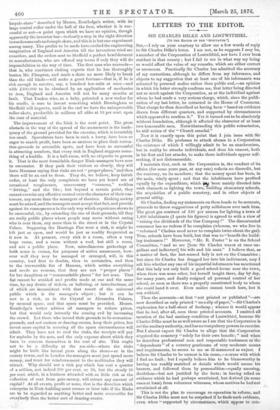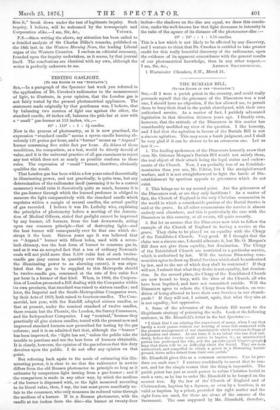LETTERS TO THE EDITOR.
SIR CHARLES DILKE AND LOSTVVITHIEL. (Fo vas Burros or THE .EIrscriToa."1 rely on your courtesy to allow me a few words of reply to Sir Charles Dilke's letter. I am not, as he suggests I may be, a member of the Corporation of Lostwithiel, nor have I ever been resident in that county ; but I fail to see in what way my being so would affect the value of my remarks, which are either correct or erroneous. Practically Sir Charles has admitted the accuracy of my corrections, although he differs from my inferences, and objects to my suggestion that at least one of his informants was actuated by personal malice rather than public zeal,—an opinion in which his letter strongly confirms me, that letter being directed not so much against the Corporation, as at the individual against whom he had made a very serious charge, which, since the publi- cation of my last letter, he retracted in the House of Commons. That charge he then described as having been "based on evidence drawn from different quarters, and supported by circumstances which appeared to confirm it." Yet it turned out to be absolutely without foundation, although it affected the character of at least two honourable men. Notwithstanding this public retraotation, he still writes of the' " Church scandal."
Now it is exactly upon this point that I join issue with Sir Charles Dilke. He professes to attack abuses in a Corporation the existence of which I willingly admit to be an anachronism, but in reality he attacks individuals, and does his utmost, both in his first and last attacks, to make those individuals appear self- seeking, if not dishonourable.
I maintain that, such as the Corporation is, the conduct of its affairs (for some years past, at any rate) reflects no discredit, but the contrary, on its members; that the money spent has been, in the main, wisely spent ; and that the inhabitants have profited equally by the expenditure, which been mainly directed into such channels as lighting the town, uilding elementary schools, the acquisition of a public cemetery, and in other objects of general utility.
Sir Charles, finding my statements on these heads to be accurate,
proceeds to throw suggestions of petty selfishness over each item. The great gas contract of £40 per annum for lighting a town of 1,400 inhabitants (I quote his figures) is agreed to with a view of "raising the dividends of the Gas Company !" The discontented consumer has no redress if he complains (whereas, we who live in " reformed " Chelsea need never to complain twice about the gas). True, schools have been built, but that was to "benefit the build- ing tradesmen !" Moreover, " Mr. R. Foster " is on the School Committee, " and so are [here Sir Charles waxes at once un- gallant and indiscreet] his wife and his aunt." I believe that, as a matter of fact, the last-named lady is not on the Committee ; but since Sir Charles has dragged her into his indictment, may I ask him whether any one of his impartial informants has mentioned that this lady not only built a good school-house near the town, when there was none other, but herself taught there, day by day, for many years, and finally resigned all personal control of her school, so soon as there was a properly constituted body to whom she could hand it over. Even malice cannot touch here, but it can withhold.
Then the accounts—at first "not printed or published "—are
now described as only printed " on a slip of paper,"—Sir Charles's euphemism for a half-sheet of foolscap ; whence it would appear that he had, after all, seen these printed accounts. I omitted all mention of the bad sanitary condition of Lostwithiel, because Sir Charles Dilke must be as well aware as I am that the Corporation is not the sanitary authority, and has no compulsory powers to exercise. But I almost expect Sir Charles to allege that the Corporation acquired the cemetery "solely for their own benefit ; " and when he describes professional men and respectable tradesmen as the " dependants " of a country gentleman of very moderate means and requirements, he seems to me as ill-mannered as unjust. I believe Sir Charles to be earnest in his cause,—a cause with which I find no fault ; but I equally believe him to be blameworthy in having too readily snatched at details which would amuse his hearers, and followed them by personalities—equally amusing, doubtless—but not justified by the facts; in having relied on evidence which he had perhaps scrutinised, but derived (in some cases at least) from volunteer witnesses, whose motives he had not scrutinised at all.
This is not the plan to encourage co-operation in reform, and Sir Charles Dilke must not be surprised if he finds such evidence, even when " supported by circulnstance, which appear to con- firm it," break down under the teat of legitimate inquiry. Such inquiry, I believe, will be welcomed by the townspeople and Corporation am, Sir, &c., VINDEX.
P.S.—Since writing the above, my attention has been called to -a detailed analysis of Sir Charles Dilke's remarks, published on the 18th inst. in the Western Morning News, the leading Liberal organ of the Western Counties. I enclose an editorial summary, founded upon the inquiry undertaken, as it seems, by that journal itself. The &mansions are identical with my own, although the writer is perfectly unknown to me.



































 Previous page
Previous page